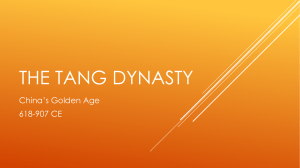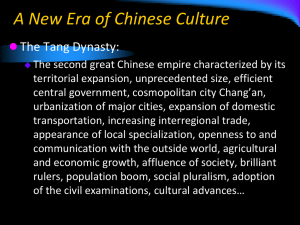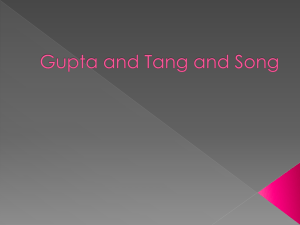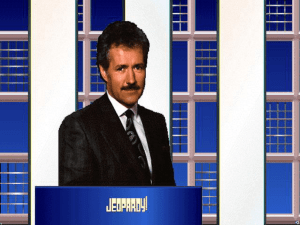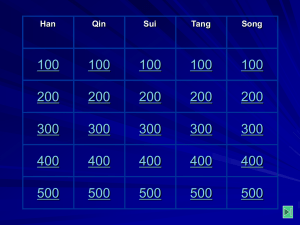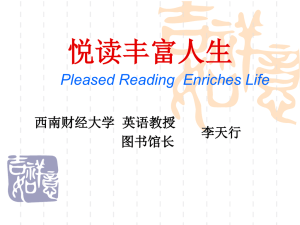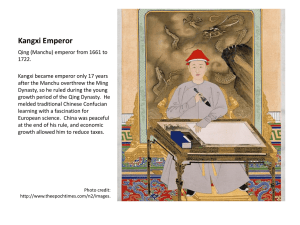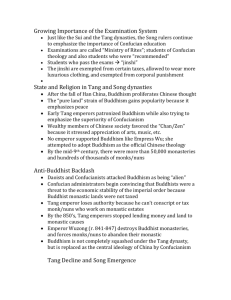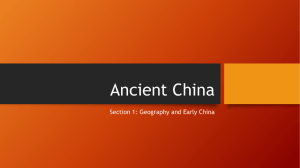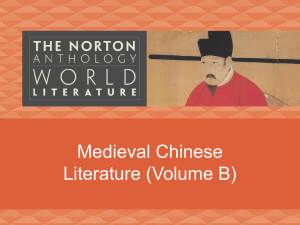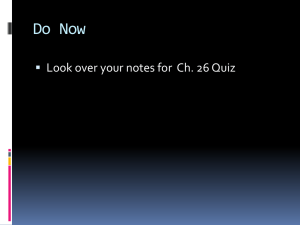The TANg dynasty - MrsVangelista.com
advertisement
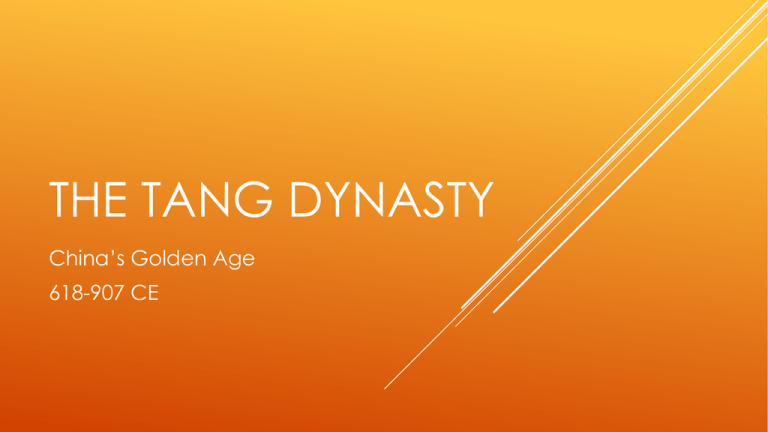
THE TANG DYNASTY China’s Golden Age 618-907 CE GOVERNMENT Founded by Li Yuan, who had been a chancellor during the Sui Dynasty (he would argue they lost the Mandate of…?) After his death, was taken over by his son, Taizong. Upon Taizong’s death, was taken over by Gaozong. How does this fit with our definition of a dynasty? Tang Dynasty revived the glory days of the Han Dynasty, and made it even better Claimed the areas of Tibet, Vietnam, and Korea as tributary states (they were required to send the Tang a gift every year to recognize their power) Government gave land to ordinary people and required them to pay taxes on this land Created public works projects (ex. Roads, canals). Is this similar to other dynasties? Why or why not? Gaozong GOVERNMENT EMPRESS WU ZETIAN Was married to Emperor Gaozong. When he became emperor, she became empress After Gaozong died, their sons ruled. But in 690 she removed her family members from office and began to rule on her own Ruled the Tang Dynasty on her own from 690705 (the year she died) Why do you think it was uncommon for females to be rulers? Why may she look ‘masculine’ in her photo? SOCIAL LIFE: EDUCATION How do you think school was different in China than it is here? Schools were standardized, so all students learned the same information Schools not provided by the government, so parents would hire tutors or communities might pay for schools and teachers Education was expensive, so it was more likely for those in the upper class to become educated. Is this the same as in Canada? Students studied the Four Books and the Five Classics (Confucian virtues) Students underwent rigorous examinations related to the classics and government. Why do you think they had exams? They also needed to have good calligraphy (lettering) SOCIAL LIFE: BEING COSMOPOLITAN What does ‘cosmopolitan’ mean? A lot of tourism during the Tang Dynasty to large cities (Chang’an, which is present-day Xi’an) Chang’an divided into 108 wards, each enclosed by walls. Some for Christians, Muslims, and Jews. Why would these people be there? Trade brought many valuable items to China: horses, jewels, instruments, fabrics. The number of merchants in China grew Artwork: pottery, paintings, jade carving. More common to see scenes from every day life, and influence by other cultures Using chairs and stools to sit instead of sitting on the floor: why? New styles of poetry that followed strict rules related to syllables and rhythm Role of women: some women went to school, became writers and artists, or helped to run family businesses PHILOSOPHIES Confucianism was very popular during the Tang Dynasty Students studied the Four Books and the Five Classics Merchants were not appreciated during this dynasty because they were believed to clash with Confucianism (merchants would keep profits for themselves, while Confucian farmers and artisans would produce goods for all of society) Buddhism and Daoist themes present in artwork. What were some characteristics of these philosophies? What does the presence of many philosophies tell us about Tang society? Is it complex or basic? Confucius INVENTIONS Gunpowder (850): Used in fireworks and weapons Smallpox vaccine (900s): To counter the disease Block printing (700s): To decorate books and art Why would these inventions have been useful at the time? How would they have spread to other parts of the world? Would they be the same in other parts of the world, or different? Do we still use these inventions in our society? Why or why not? THE END OF A DYNASTY China had been ruled by Emperor Xuanzong “Brilliant Emperor” Fell in love with a woman named Yan Guifei Yan Guifei loved an official named An Lushan An Lushan rebelled against Xuanzong for not receiving a government post Xuanzong’s troops retreated. They had Yan Guifei killed Xuanzong gave the empire to his son Many rebellions happened after that, and the dynasty ended in 907
